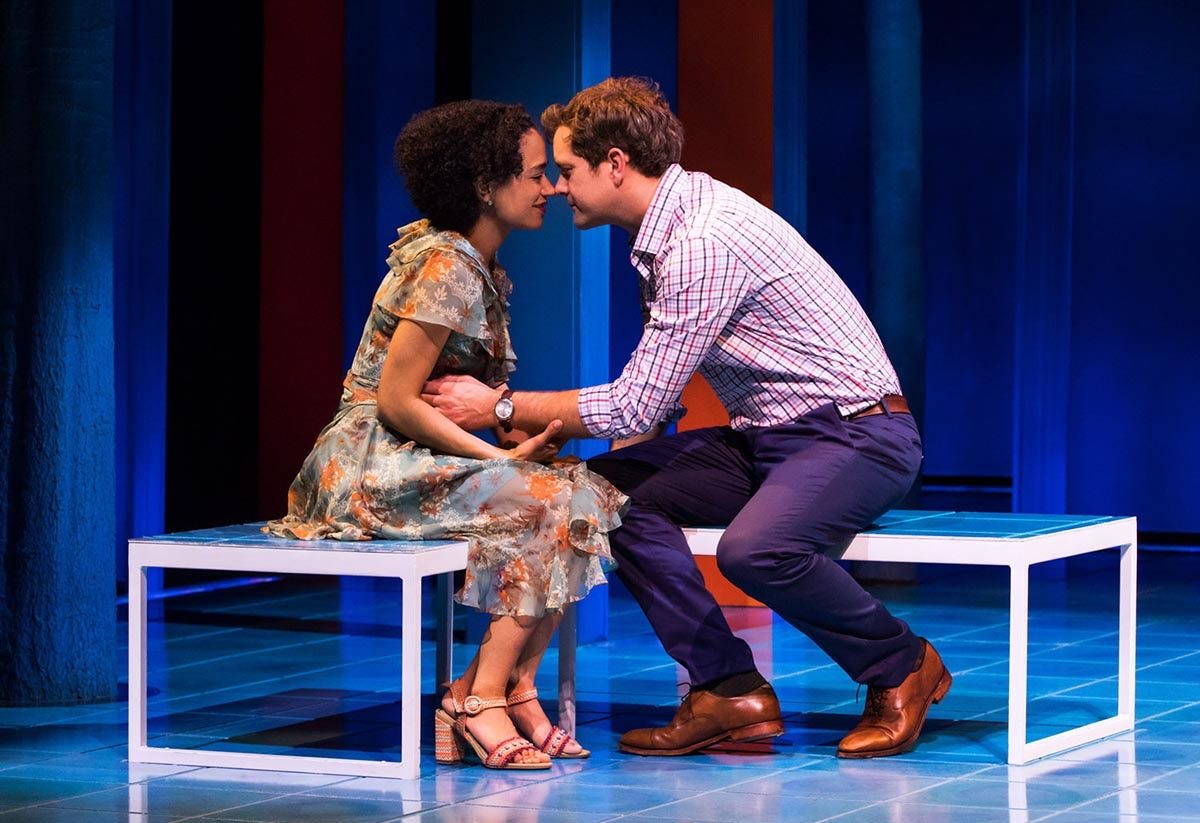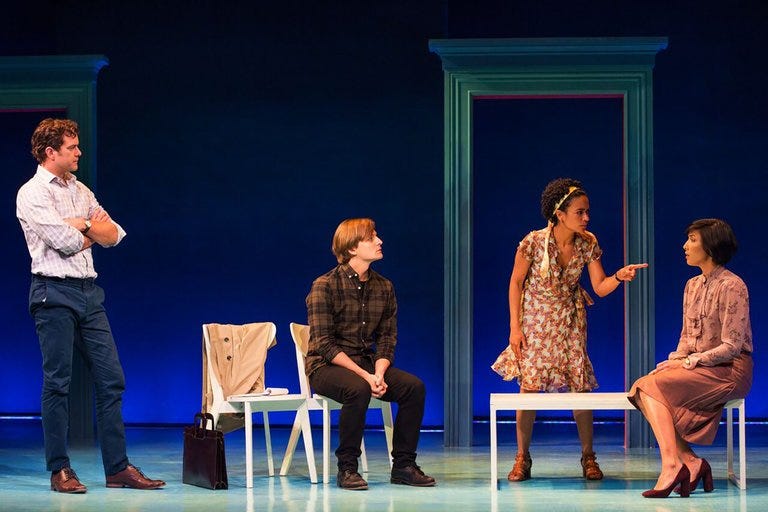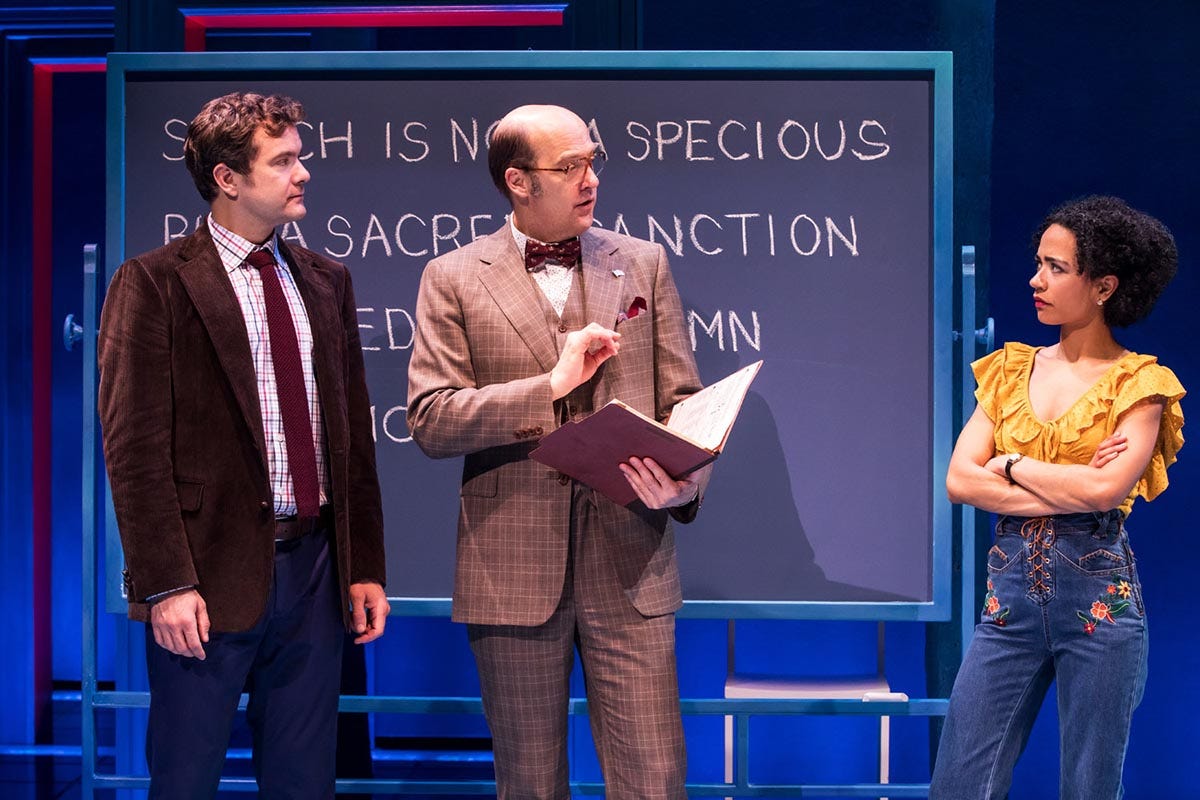Contrary to popular belief, deafness is not a curse; it is not the end of the world, it is not something that necessarily needs to be cured. Many deaf people do not consider themselves disabled, but instead, classify themselves as belonging to a linguistic community. If you only speak Albanian, being in a room of English-speaking people is no different than being a deaf person in a room full of hearing and speaking people. Thus, not all deaf people want to read lips, learn how to speak, or get cochlear implants.
Theoretically, all of this information is the theme of Mark Medoff’s 1979 play, “Children of a Lesser God,” the revival of which opened at Studio 54 on Wednesday. The play concerns Sarah Norman, a deaf woman, and her teacher-turned-husband James Leeds. James, played by Joshua Jackson, is passionate about teaching his deaf students to communicate not through sign language, but through speech, something that is often difficult, embarrassing, and frustrating for deaf people. Sarah, played by Lauren Ridloff, refuses even to attempt speaking.
In an unexpected (and unsubstantiated) plot twist, they somehow fall in love and get married, although it is unclear when, how, or why this happens. Soon, James learns that with the marriage comes a lifetime of being an interpreter, a role he does not want. From there, tensions arise as James and Sarah fight over their different opinions of deafness, speech, children, and the future.
James represents everything wrong with the way society thinks about deafness. However, the play itself often tells us he is wrong, mainly through Sarah and her deaf friend/student/teacher/activist, Orin (played by John McGinty), both of who constantly disagree with him and tell him that he’ll never understand what it is like to live in their silence.

Despite the fact that James is told he is wrong, this entire production is focalized through him; he is perpetually at the center and never leaves the stage. Mr. Jackson gives a completely unenthusiastic, lackluster performance, producing a pompous and condescending vibe that, like him, never seems to go away. Because of this, the audience never connects with him. Instead, they feel annoyed, angry, and most of all, confused as to why Sarah wants to be with him.
Lauren Ridloff, who like her character was born deaf, provides such a powerful honesty to her character that it is impossible not to side with her and to believe everything she says. At no point does her lack of speech limit her acting ability; in fact, she manages to emote more with her face and hands than Jackson does with speech. For a newbie to professional acting, she is quite sublime.
Similar accolades must be given to the supporting cast. John McGinty (also deaf), like Orin, a deaf activist who learns to speak only so he can advocate getting more deaf teachers hired, perfectly captures the passion of deaf and disabled activists. Treshelle Edmond (also deaf) plays Lydia, a precocious student, with perfect teenage naivete. Julee Cerda as the legal advocate Edna Klein, Kecia Lewis as Mrs. Norman, and Anthony Edwards as the head of the deaf school, Mr. Franklin, round out the cast perfectly. Each of these hearing characters displays varying degrees of cluelessness or lack of understanding about deafness, often acting as stand-ins for the uninformed audience.

However, the issues begin to crop up when it is not only the audience that is uninformed but the director, Kenny Leon. Perhaps Mr. Leon is unaware that “Children of a Lesser God” is a deeply offensive play that majority of the deaf community loathes. Perhaps he does not understand that James is wrong to make decisions about and for Sarah. Perhaps he did not realize that the play is really about Sarah and her deafness, not James and his (selfish) “struggles.” Perhaps he and the producers did not know that no one wanted a revival of a play about forcing a deaf woman to speak on Broadway in 2018.
The design also left some lingering questions. The set, designed by Derek McLane, was a minimalist, monochromatic mix of branchless-trees and doorless-door frames. Lights by Mike Baldassari were oddly dim, blue, and dreamlike. Both designers were seemingly creating a space more fit for a postmodern experimental ballet than a naturalist play. Almost every scene transition included unnecessary music (sound design by Jill Bc Du Boff, composition by Branford Marsalis), an odd choice for a play about deafness, after all.
The production did make slight attempts at being more accessible, most notably in the inclusion of supertitles above the stage. Fascinatingly, the supertitles only include text for the words that were spoken onstage; they did not translate the sign language. This choice made it clear that the supertitles were not to make the play “easier” for hearing people but to make it more accessible for deaf and hearing impaired audience members. Kudos to whoever made that decision.
However, the gesture is somewhat empty, because every time Sarah signs (and the supertitles say “Sarah signs”), hearing audience members are not excluded, are not forced to sit in the silence. Instead, James echoes and repeats everything she signs — which is completely unnecessary and unrealistic, since he understands sign language. This pattern of him speaking for her is present in Medoff’s script and is therefore unavoidable. But what is avoidable is a production of a problematic play that includes a hearing character speaking for a deaf character; why do the play at all?

To make matters worse, Mr. Jackson is not fluent in sign language and could not be bothered to study it diligently for this production. His signing is sloppy and sometimes almost nonexistent. But what is most careless is the pace at which he translates Sarah signing into English: he is not able to read her signs or follow along. He translates so quickly that it is evident he is reciting memorized lines and not watching and translating her signs. Equally frustrating is the imprecise recitation of his lines, which often don’t match the supertitles above him.
The only selling point for the production is that it stars three deaf actors; any piece of theater that includes that visibility and provides work for deaf actors is worthy of some praise.
“Children of a Lesser God” is a deeply flawed play. If you asked any deaf person their opinion about it, they would probably have a whole rant, and certainly would not encourage you to see or read it. I am not sure why Mr. Leon wanted to revive this problematic tome of yesteryear, or why he thought it was acceptable not to try to recuperate it, change it, and recenter it on the deaf characters. More than anything else, this production of “Children of a Lesser God” proves that some plays are best left on the shelf.






